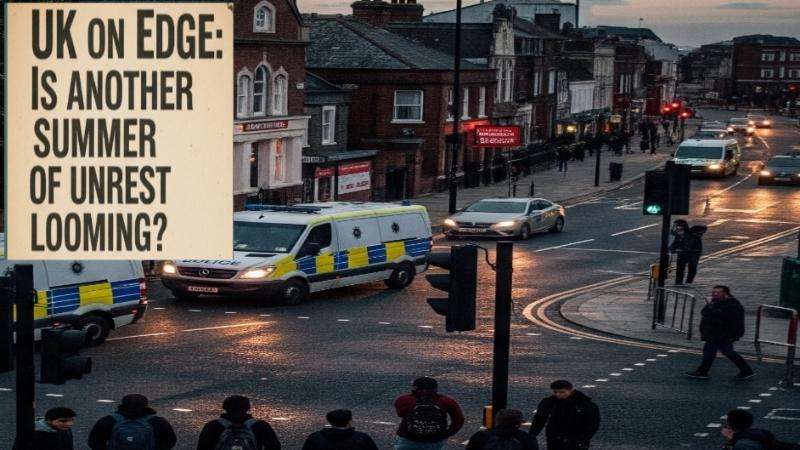The United Kingdom is teetering on the brink of widespread social unrest, with a new report describing the nation as a "powder keg" of unresolved tensions. A year after the impactful riots that swept across the country last summer, particularly following the tragic Southport knife attack, urgent concerns are being raised about a potential rekindling of violence. This precarious situation is compounded by deepening political polarisation, declining trust in institutions, and a cost of living crisis that is disproportionately affecting vulnerable communities.
The Unaddressed Powder Keg
Research from the think tank British Future and the social cohesion group Belong Network, presented in their report "The State of Us," paints a stark picture of a fragmented society. A significant 31% of adults report rarely or never having opportunities to meet people from different backgrounds, and a third admit they do not frequently interact with others in their local community at all. This lack of social contact, partly driven by economic pressures where half of respondents say they don't always have enough money to go to places where they would meet others, creates fertile ground for misunderstanding and division.
Former Conservative chancellor Sajid Javid and Labour politician Jon Cruddas, co-chairs of the new Independent Commission on Community and Cohesion, underscored the urgency in their foreword to the report: "The bonds that hold society together – civic participation and a shared sense of belonging – are under growing pressure. This is leaving our society more fragmented, fragile and less resilient to internal and external threats."
The report identifies several key drivers of this fragility: widespread concern about declining public services, persistent inequality, the relentless cost of living crisis, and the pervasive impact of social media. A profound lack of trust in politicians and institutions to effectively address these issues further exacerbates public frustration. Immigration and asylum also remain flashpoints, with concerns often focused on integration and perceived pressures on housing and public services.
The Shadow of Last Summer's Riots and Their Disproportionate Impact
The Southport riots of last summer served as a stark warning of the UK's fragile social cohesion. Fueled by rapid disinformation online, particularly concerning the identity of the Southport attacker, these incidents quickly escalated into violent protests. Mosques were attacked, hotels housing asylum seekers were targeted, and clashes erupted with anti-racism counter-protesters. Over 100 individuals were arrested in central London during subsequent unrest.
For British Bangladeshi, British Pakistani, British Indian, broader British South Asian, African, and especially British Muslim communities, these riots had a profound and immediate impact. Mosques, community centers, and businesses in areas with significant Muslim populations became targets, leading to fear and insecurity. Reports indicated a significant rise in Islamophobic and anti-immigrant sentiment, with online misinformation playing a critical role in inciting hatred. Police in England and Wales, for example, recorded a spike in hate crimes, with a notable increase in anti-Muslim offences (up by 13% between the Gaza war's outbreak and March 2024, though antisemitic offenses saw a larger rise). Individuals were charged with offenses ranging from violent disorder to racially motivated criminal damage, and even online incitement to racial hatred. The attacks on visible minorities and asylum seekers marked some of the worst targeted violence the UK had seen in a generation, leaving deep scars of mistrust and trauma within these communities. The swift condemnation by then-Prime Minister Sir Keir Starmer of the "far-right thuggery" underscored the severity of the situation and the targeted nature of the violence.
A Changing Political Landscape: The Rise of the Far-Right
The current political landscape in the UK adds a worrying dimension to these social tensions. While the exact definition of "far-right leading" is nuanced, recent polling data indicates a significant surge in support for Reform UK, a party with right-wing populist and hard Eurosceptic ideologies, founded by Nigel Farage. A YouGov poll from late June 2025 suggested that if a general election were held now, Reform UK could become the largest political party, potentially winning 271 of the 650 seats in the House of Commons, placing them ahead of Labour. This unprecedented shift, driven by disillusionment with mainstream parties and public concerns about immigration, signifies a growing appetite for policies often associated with the right-wing.
This rise in far-right influence is particularly concerning for minority communities. Reform UK's platform, centered on promises to "stop small boats" carrying undocumented migrants and freezing "non-essential" immigration, resonates with those holding anxieties about new arrivals. While immigration is a legitimate political debate, the amplification of certain narratives, often by public figures and amplified on social media, can contribute to a hostile environment for immigrant and minority communities.
Anti-hate campaigners are actively highlighting the role of social media platforms, particularly X (formerly Twitter), in amplifying and monetising dangerous content. Research by the Centre for Countering Digital Hate (CCDH) found over 4,300 posts in the past year promoting violence against Muslims and immigrants, often in replies to high-profile accounts like Tommy Robinson and Andrew Tate. Imran Ahmed, CCDH chief executive, warned that X "remains the crucial hub for hate-filled lies and incitement of violence targeting migrants and Muslims." He argued that unless social media firms enforce their own rules, the "profit-driven amplification of violent and hateful content" will continue to "metastasise, with devastating consequences for British society."
Pathways to Stability
The "The State of Us" report, which will serve as a foundational input for the Independent Commission on Community and Cohesion, emphasizes that successive governments have failed to take sustained, proactive measures to address social cohesion, leading to a "doom loop" of inaction and piecemeal responses.
While the challenges are significant, the report also identifies reasons for optimism. A notable 69% of people feel their local area is a place where people from different backgrounds get on well together. Many participants also recalled moments of togetherness and community strength during the adversity of the Covid-19 lockdowns.
However, Jake Puddle, a senior researcher at British Future, issued a clear warning: "We are facing a long, hot summer, with a powder keg of tensions left largely unaddressed from last year that could easily ignite once again." Kelly Fowler, chief executive of the Belong Network, stressed that social cohesion needs to be "treated with the urgency it merits, in every part of Britain. We must not wait for more riots to happen."
Preventing further unrest requires a multi-faceted approach: addressing the root causes of economic inequality, rebuilding trust in public institutions, fostering genuine inter-community dialogue, and holding social media platforms accountable for the content they disseminate. For British Bangladeshi, Pakistani, Indian, South Asian, African, and particularly British Muslim communities, ensuring their safety, countering targeted misinformation, and promoting inclusive narratives will be paramount in navigating this potentially turbulent summer.








.svg)


_1.jpg)
_1.jpg)
_3.jpg)
_3.jpg)